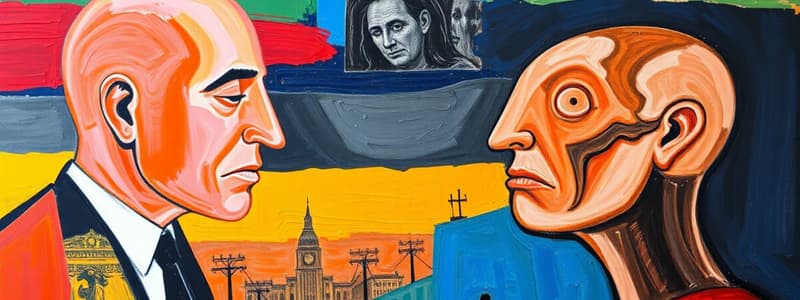Podcast
Questions and Answers
What was a direct result of overproduction in the market during the Great Depression?
What was a direct result of overproduction in the market during the Great Depression?
- Surpluses causing prices to drop (correct)
- Rise in agricultural exports
- Increased consumer spending
- Expansion of manufacturing jobs
How did the unequal distribution of wealth contribute to the Great Depression?
How did the unequal distribution of wealth contribute to the Great Depression?
- It limited consumer spending due to reduced disposable income. (correct)
- It encouraged the expansion of credit facilities.
- It boosted investment in the stock market.
- It increased government revenue through taxation.
What was one of the financial practices that led to the economic bubble before the Great Depression?
What was one of the financial practices that led to the economic bubble before the Great Depression?
- Increasing savings accounts
- Selling stocks for cash
- Stock market speculation on margin (correct)
- Investing in tangible assets
What psychological effect did the Great Depression have on families, particularly on men?
What psychological effect did the Great Depression have on families, particularly on men?
What characterized the economic policies of Republican presidents during the 1920s?
What characterized the economic policies of Republican presidents during the 1920s?
What was Hoover's belief that influenced his policies during the Great Depression?
What was Hoover's belief that influenced his policies during the Great Depression?
What was a significant impact of the Dust Bowl during the Great Depression?
What was a significant impact of the Dust Bowl during the Great Depression?
Which factor contributed to the economic contraction following the boom of the 1920s?
Which factor contributed to the economic contraction following the boom of the 1920s?
What event highlighted the inadequacies of the government's response during the economic crisis?
What event highlighted the inadequacies of the government's response during the economic crisis?
What was one of the major consequences of the Great Depression on the banking system?
What was one of the major consequences of the Great Depression on the banking system?
Which cultural movement is associated with the migration of African Americans from the rural South to urban centers in the North?
Which cultural movement is associated with the migration of African Americans from the rural South to urban centers in the North?
Who among the following was a prominent figure during the Harlem Renaissance known for addressing social issues?
Who among the following was a prominent figure during the Harlem Renaissance known for addressing social issues?
What major legislation prohibited the manufacture, sale, and transportation of alcohol?
What major legislation prohibited the manufacture, sale, and transportation of alcohol?
What was a direct result of the ratification of the 19th Amendment in 1920?
What was a direct result of the ratification of the 19th Amendment in 1920?
Which aspect of culture was notably defined during the Jazz Age?
Which aspect of culture was notably defined during the Jazz Age?
What was a significant social consequence of the Cultural Revolution during the Jazz Age?
What was a significant social consequence of the Cultural Revolution during the Jazz Age?
Flashcards are hidden until you start studying
Study Notes
Economic Factors of the Great Depression
- Overproduction: Excess goods led to price drops, hurting farmers and manufacturers. The Dust Bowl worsened this by destroying crops.
- Unequal Wealth Distribution: A small, wealthy population limited consumer spending as the poor had little disposable income.
Financial Practices Leading to the Great Depression
- Stock Market Speculation: Inflated stock values due to buying on margin (borrowing to invest) created a bubble that burst on Black Tuesday (October 29, 1929).
- Credit and Installment Buying: Easy credit allowed buying without immediate payment, but led to widespread debt when the economy faltered.
Psychological Impact of the Great Depression
- Emotional Strain: Economic hardship caused stress on families, especially men who felt pressure to provide. Shifting from confidence to panic harmed morale and led to mental health issues.
- Economic Cycle: The natural cycle of growth and recession played a role. The booming 1920s were followed by a sharp contraction.
Republican Leadership and Policies
- Harding, Coolidge, and Hoover: These presidents favored laissez-faire economics, meaning minimal government intervention. This led to tax cuts for the wealthy and deregulation, which some argue contributed to instability.
- Hoover's Philosophy: "Rugged Individualism" emphasized self-reliance. His administration faced criticism for inadequate responses to the economic crisis, including during the Bonus Army protests.
Banking Crisis
- Bank Failures: Risky loans and waning public confidence resulted in bank runs and widespread closures. This exacerbated the economic downturn.
The Harlem Renaissance
- Great Migration: African Americans moved from the rural South to urban centers in the North.
- Cultural Flourishing: The Harlem Renaissance saw the emergence of influential art, music, and literature celebrating Black culture.
- Cultural Contributions: Key figures like Langston Hughes and Zora Neale Hurston used art to address social issues and promote racial pride. Jazz music became a defining feature of the era with artists like Duke Ellington and Louis Armstrong.
Prohibition
- 18th Amendment (1920): Prohibited alcohol, leading to organized crime and the rise of figures like Al Capone.
- Repeal (1933): The 21st Amendment repealed Prohibition due to negative consequences like increased crime and loss of tax revenue.
Women's Suffrage
- 19th Amendment (1920): Granted women the right to vote, increasing their political participation.
- Impact on Society: Women's newfound political power contributed to changes in societal norms and expectations, paving the way for future advances in gender equality.
The Jazz Age and Cultural Shifts
- Cultural Revolution: New music, flappers, and a vibrant, rebellious youth culture emerged.
- Influence on Future Generations: The artistic innovations of the Jazz Age laid the groundwork for future artistic and cultural movements.
Studying That Suits You
Use AI to generate personalized quizzes and flashcards to suit your learning preferences.



